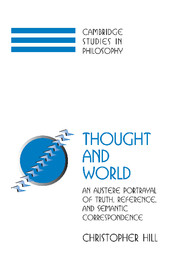Book contents
- Frontmatter
- Contents
- Acknowledgments
- 1 Introduction
- 2 Truth in the Realm of Thoughts
- 3 The Marriage of Heaven and Hell: Reconciling Deflationary Semantics with Correspondence Intuitions
- 4 Indexical Representation and Deflationary Semantics
- 5 Why Meaning Matters
- 6 Into the Wild Blue Yonder: Nondesignating Concepts, Vagueness, Semantic Paradox, and Logical Paradox
- Notes
- Index
6 - Into the Wild Blue Yonder: Nondesignating Concepts, Vagueness, Semantic Paradox, and Logical Paradox
Published online by Cambridge University Press: 07 December 2009
- Frontmatter
- Contents
- Acknowledgments
- 1 Introduction
- 2 Truth in the Realm of Thoughts
- 3 The Marriage of Heaven and Hell: Reconciling Deflationary Semantics with Correspondence Intuitions
- 4 Indexical Representation and Deflationary Semantics
- 5 Why Meaning Matters
- 6 Into the Wild Blue Yonder: Nondesignating Concepts, Vagueness, Semantic Paradox, and Logical Paradox
- Notes
- Index
Summary
There are a number of problems concerning our semantic concepts that a theory of truth must eventually face. I have discussed some of these problems in the foregoing pages, but nothing has been said thus far about two members of this category that are widely regarded as particularly important. I am unable to do justice to either of these problems in the present work, but it would be inappropriate to ignore them altogether. I must say what they are, explain how they interact with the main themes of the present work, and specify the obligations that they entail for someone who is concerned to develop those themes.
The first of these problems is the problem of bivalence. It arises from the fact that we have conflicting intuitions concerning the law of bivalence – that is, concerning the principle that every proposition is either true or false. Some of our intuitions appear to endorse this law. But we also have intuitions that appear to conflict with it. For example, where P is any logically simple proposition containing a nondesignating singular concept, such as the proposition that Achilles was exactly six feet tall, we have a fairly strong inclination to deny that P is true and also a fairly strong inclination to deny that P is false. And the same applies to the members of several other categories of propositions.
- Type
- Chapter
- Information
- Thought and WorldAn Austere Portrayal of Truth, Reference, and Semantic Correspondence, pp. 109 - 126Publisher: Cambridge University PressPrint publication year: 2002



